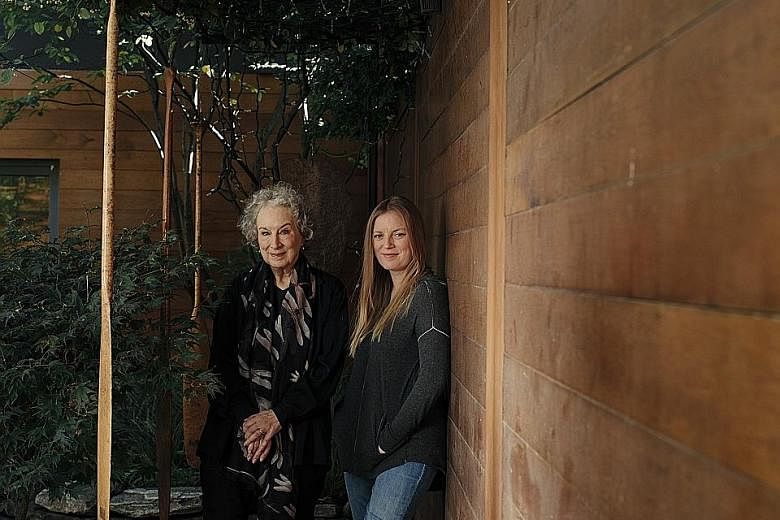TORONTO •The "killer" blow of a rejection did not snuff the life out of Sarah Polley's dream. More than 20 years ago, she, then a precocious teenage girl at 17, had sent in an audacious request to novelist Margaret Atwood.
She had just read Atwood's Alias Grace (1996) and found herself entranced by the true story of Grace Marks, a 19th-century Irish immigrant and servant who became a celebrity "murderess" in Toronto.
She sent Atwood a letter seeking the movie rights. Polley was then best known as a Canadian child star from Disney Channel's Road To Avonlea and years away from becoming a screenwriter and director of independent films such as Away From Her (2006) and Take This Waltz (2011).
Atwood declined. "She was 17," she said. "I didn't think she had the wherewithal."
Now, at 38, the dream has come true for Polley. She is the writer and a producer of the mini-series adaptation of the Booker Prize-shortlisted book, debuting on Netflix on Friday.
After decades of sputtering starts - both actresses Jodie Foster and Cate Blanchett were attached at various points - Alias Grace arrives at a time of peak Atwood.
Last month, the Hulu adaptation of her 1985 book The Handmaid's Tale became the first streaming-service show to win an Emmy for best drama. Her back catalogue is on bestseller lists and the 77-year-old is an Internet star.
Said Polley: "The Handmaid's Tale offers us a window into a possible future when women's rights are eroded. Alias Grace offers a look at what it was like before women had any rights."
Over breakfast in a restaurant in Toronto, she recalled how the character Grace had never ceased burrowing in her imagination.
"To be a woman in that time, or any time, there are parts of your personality and responses to things that you're expected to suppress," she said.
"So what happens to all that energy and anger? What do you do with powerlessness?
"The idea of having more than one identity, the face you show to the world and the face that's deep within, captivated me."
When the screen rights came up for grabs in 2012, she pounced. She took a six-hour meeting with Atwood.
The author said: "She understood that the ambiguity mattered most, but ambiguity is tricky on film.
"Grace was convicted as an accessory because she didn't tell. We never knew and she never told. She acted as one of those blank screens onto which everybody commenting projected."
Polley paid out of pocket for the rights. CBC, Canada's public broadcaster, came on board immediately, but a partner was needed to hit the US$25-million (S$34-million) budget. Netflix, increasingly looking at original content, signed on.
"They came in with a clear vision and 500 pages written," said Ms Elizabeth Bradley, vice-president for content at Netflix.
As Alias Grace was shot through United States President Donald Trump's election, some of its themes gained new resonance, such as immigration (Polley wrote Grace's harsh crossing from Ireland with recent migrant crises in mind) and abortion.
The US House Of Representatives has passed a Bill banning late-term abortions and the administration has moved to expand the rights of employers to deny women insurance coverage for contraception.
Atwood said: "We are at a moment in history when some parts of North America are trying to turn the clock back, and if they want to turn it back, what do they want to turn it back to?
"There's a reason the women's movement really started in the 19th century. If they do go back, they'll end up" with a woman "dying on a bloody mattress".
Viewers in Canada, where Alias Grace began airing in late September, have responded. The ratings for the first episode were the strongest fall debut for a CBC drama in the past five years.
But Atwood has caught some flak too. She was recently criticised in the Toronto news media for Nimby-ism after joining her neighbours in petitioning city officials to revise plans for an eight-storey condominium development that, Atwood wrote in a letter, might affect privacy.
Polley, too, has felt the sting of backlash. She has not directed in five years or appeared in a film since 2010, choosing to spend time with her children and work selectively.
But with so few female directors in the marketplace, she is conscious that some view her stepping back as an act of betrayal.
At a party, Polley mentioned to a female critic that she was parenting, not directing, and the woman made a vomiting noise. "The choice I made freely is, I would like to be with my children as much as possible. I think it's a victory of feminism, not a failure," she said.
Then, she returned to Atwood's words about a denigrated Victorian housemaid, maybe framed for murder or maybe pushed to it.
"There's a line where Dr Jordan (a character on the show) says something like, 'I wonder how much sublimated rage she must have carried with her, this child harassed on every corner'.
"And I wonder too. I don't just wonder about a domestic servant in the 1800s. I wonder about women in every single field, every single day."
NYTIMES

